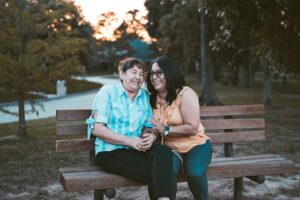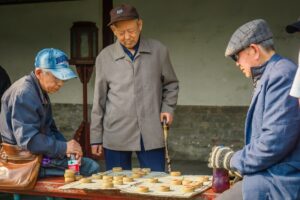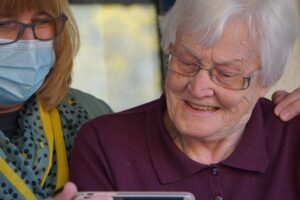Page Contents
As people age, they often experience a variety of life changes that can lead to feelings of loneliness and social isolation. Some of these changes might include the loss of a spouse or close friends, retirement, health issues, or difficulty leaving the house.
Loneliness and social isolation can have negative impacts on physical and mental health, hence, it is important for older adults to find ways to cope with these feelings.
Stay connected with friends and family
Loneliness and social isolation can be exacerbated when there is a lack of meaningful social connections. Even if an older adult is unable to leave the house due to physical challenges, technology can offer ways to stay connected with people. Phone calls, video chats, and social media can all be used to communicate with family and friends. Older adults can also consider participating in online communities or forums that align with their interests.

Join a senior community group
Joining a senior community group can provide a sense of belonging and an opportunity to network and engage in social activities. Many centers offer a variety of activities and classes such as exercise programs, art classes, cooking lessons, and game nights. Some community groups may focus on shared interests such as gardening, reading, sports, outing, tour, etc.

Volunteer
Volunteering is a great way to give back to the community and meet new people. It can provide a sense of purpose and fulfillment. Older adults who are still healthy and active can consider volunteering at a local school, library, or hospital. They can also look for opportunities to volunteer in their own community or online.

Stay active
Physical activity is important for maintaining physical and mental health. Older adults can engage in physical activities that are appropriate for their age and ability level. This could include taking walks, practising yoga, tai chi quan, or joining a fitness class. Exercise not only helps reduce stress and promote a sense of well-being, it can also build up strength and reflexes, which reduces the risk of fall.

Find a hobby or group activity
Finding a hobby or activity that brings joy and fulfillment can help combat feelings of loneliness and social isolation. It can also provide a sense of purpose and a way to connect with others who share similar interests. Some examples of hobbies and activities include crafting, calligraphy, painting, cooking, gardening, or playing music.

Take care of your physical health
Physical health can have a significant impact on mental health. Older adults should prioritize their physical health by eating a healthy diet, getting enough sleep, and scheduling regular health check-ups with their healthcare provider. This can help prevent and manage chronic health conditions that may contribute to social isolation.

Practice self-care
Taking time to care for oneself can help reduce stress and promote overall well-being. Older adults can engage in self-care activities such as taking a relaxing bath, reading a book, writing journals, or listening to music. Self-care can help promote feelings of calm and relaxation.

Consider getting a pet
Pets can provide companionship and emotional support. If it’s feasible, older adults may consider getting a pet that can provide love and affection. Dogs and cats are common choices, but other pets such as birds or fish may also provide companionship and entertainment.

Embrace technology
Technology can be a powerful tool for combating feelings of loneliness and social isolation. Older adults can use social media, video chats, or online forums to connect with others. Technology can also be used to access resources such as online support groups or courses. It is important for older adults to feel comfortable using technology and to seek help whenever needed.

Conclusion
Loneliness and social isolation can be difficult to cope with, especially in old age. However, there are many strategies that can help older adults stay connected, engaged, and fulfilled. By staying connected with loved ones, staying active, and seeking support when needed, older adults can maintain their mental and physical health and enjoy a fulfilling life.
If feelings of loneliness and social isolation persist despite efforts to cope, it may be helpful to seek professional help. A therapist or social worker can provide support and guidance on how to manage these feelings. They may also be able to connect older adults with resources in their community (e.g. befriender) that can help combat loneliness and social isolation.
